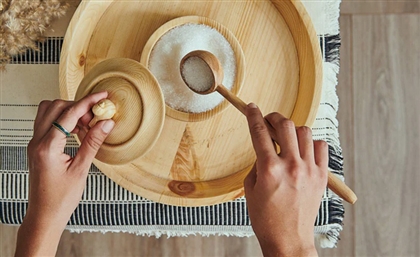EGYCOM: Empowering Upper Egypt
We speak to the team behind EGYCOM - a nifty NGO that has employed scores of artisans from the Upper Egyptian town of Al-Qayat to make international-standard furniture and wood products, utilising local materials...
You know how we always say Egypt’s so rich with resources, but we never use them and import almost everything from abroad? And how we also say oh, Egyptians are so talented but we don’t find the right motivation or capital to fund our intellectual gifts? Well, out of one of the poorest villages in Egypt comes gorgeous modern wooden furniture, thanks to the Egyptian Society for the Endogenous Development of Local Communities (EGYCOM for short), initiating change and opportunities for artisans from Al-Qayat in Menya. The result? High quality products, unique in nature and elegant in design. The furniture ranges from non-symmetrical tables to seashell adorned mirror frames to parquet flooring and wall cladding. What is most special about these products is that locals manufacture them from palm trees through a sustainable process.
Dr. Hamed Ibrahim El Mousely, an engineering professor at Ain Shams University, started EGYCOM with the help of fellow professors. EGYCOM principally aims to promote a culture that makes use of people’s intellect and creativity by utilising them in the best possible ways to produce innovative products from their local resources and raw materials. Endogenous development means that the locals get in touch with their rooted cultural selves and trust their dependable resources and socio-cultural context in order to self develop as a unique local identity.

In 2011, EGYCOM started a project in the poor village of Al-Qayat in Upper Egypt that won second place in the best development project category at the 2013 Khalifa International Date Palm Awards. It’s basically training and employing the unemployed of Al-Qayat, taking advantage of the abundant yet quite neglected resource that is palm trees and manufacturing wood that is then used to make aforementioned chic furniture.
Engineer Ahmed ElMelhy, a supervisor at the workshop in Menia tells us: “We sent some of the young workers to a furniture factory in Cairo to train and learn. Now, they’re good enough to train their other coworkers.”
The project’s achievements included the design and manufacture of innovative equipment for the conversion of palm fronds to regular panels, as well as tge manufacturing of parquet and counter slabs that match international standard specifications that are better than that made from imported wood. Dr. El Mousely explains that “bringing wood from Canada, the US or Finland is ridiculous when we have something which is very much like imported wood. It also helps poor people find resourceful and profitable work. We have 50% unemployment in Upper Egypt; it’s frightening.”
Taking comprehensive advantage of the leaves, the NGO made great efforts to use minced leaves in the production of exportable biofuel as well as in the poultry feed industry. It also cut down on the burning of palm wicker in the fields, which has had negative affects on the environment.
Omar Moneim, Al-Qayat project’s executive director, told us, “EGYCOM has been offering palm midribs boards to several furniture stores like Aly Khalil, Alphabet featured by Ebony & Ivory, Mahally with Mona Hussein and Eklego and for traditional Egyptian crafts featured by GebRaa for over two years. The designs are made by us, by one of the above-mentioned brands or specially made by order of the client. With our local, sustainable and unique products, we can help the poor villagers of Al-Qayat find sustainable job opportunities as they are now trained to produce the palm midribs strips, boards and furniture pieces.”
A project that trains the poor, employs them, uses our local resources, manufactures at excellent standards, could export these high quality products, and saves the environment a little bit - check out their catalogue here.
- Previous Article 11 Top Egyptian Street Foods
- Next Article Madonna Uses #JeSuisCharlie To Promote New Album
























